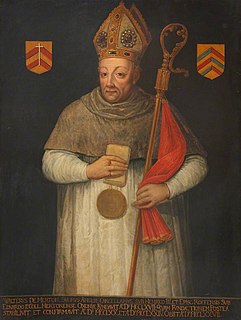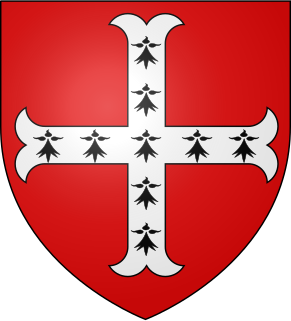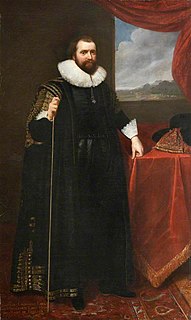Related Research Articles

The Chancellor of the Exchequer, often abbreviated to the Chancellor, is a high ranking Minister of the Crown within the Government of the United Kingdom, and head of Her Majesty's Treasury. As one of the four Great Offices of State, the Chancellor is a senior member of the British Cabinet.
Robert Burnell was an English bishop who served as Lord Chancellor of England from 1274 to 1292. A native of Shropshire, he served as a minor royal official before entering into the service of Prince Edward, the future King Edward I of England. When Edward went on the Eighth Crusade in 1270, Burnell stayed in England to secure the prince's interests. He served as regent after the death of King Henry III of England while Edward was still on crusade. He was twice elected Archbishop of Canterbury, but his personal life—which included a long-term mistress who was rumoured to have borne him four sons—prevented his confirmation by the papacy. In 1275 Burnell was elected Bishop of Bath and Wells, after Edward had appointed him Lord Chancellor in 1274.

Walter de Merton was Lord Chancellor of England, Archdeacon of Bath, founder of Merton College, Oxford, and Bishop of Rochester. For the first two years of the reign of Edward I he was - in all but name - Regent of England during the King's absence abroad. He died in 1277 after falling from his horse, and is buried in Rochester Cathedral.

The Lord Chief Justice of England and Wales is the Head of the Judiciary of England and Wales and the President of the Courts of England and Wales.

The Exchequer of Pleas, or Court of Exchequer, was a court that dealt with matters of equity, a set of legal principles based on natural law and common law in England and Wales. Originally part of the curia regis, or King's Council, the Exchequer of Pleas split from the curia in the 1190s to sit as an independent central court. The Court of Chancery's reputation for tardiness and expense resulted in much of its business transferring to the Exchequer. The Exchequer and Chancery, with similar jurisdictions, drew closer together over the years until an argument was made during the 19th century that having two seemingly-identical courts was unnecessary. As a result, the Exchequer lost its equity jurisdiction. With the Judicature Acts, the Exchequer was formally dissolved as a judicial body by an Order in Council on 16 December 1880.
John Chishull or John de Chishull was Lord Chancellor of England, Bishop of London, and Lord High Treasurer during the 13th century. He also served as Dean of St. Paul's.
Sir Ralph Sandwich (1235–1308), of Dene, Ham, and Ripple, Kent, Winchfield, Hampshire, etc., was an English administrator and justice. He was Steward of the King's Demesne, Constable of Canterbury (1278), and Royal Warden of London.

Antony Bek was a bishop of Durham.

Lionel Cranfield, 1st Earl of Middlesex was an English merchant and politician. He sat in the House of Commons between 1614 and 1622 when he was raised to the peerage as Baron Cranfield.

The Barons of the Exchequer, or barones scaccarii, were the judges of the English court known as the Exchequer of Pleas. The Barons consisted of a Chief Baron of the Exchequer and several puisne (inferior) barons. When Robert Shute was appointed second baron in June 1579 the patent declared "he shall be reputed and be of the same order, rank, estimation, dignity and pre-eminence to all intents and purposes as any puisne judge of either of the two other courts." The rise of commercial trade in Elizabethan England occasioned fraudulent application of the Quo minus writ. More taxation demanded staff at the exchequer to sift an increase in the case load causing more widespread litigation cases to come to the court. From 1580s onwards the Barons of Exchequer were no longer held in such low regard, and more likely to be Serjeants-at-law before qualification. The Inns of Courts began to exclude solicitors, and held posts for judges and barons open equally to barristers. In 1591, Regulations reflected a case in which the Lord Keeper Egerton banned solicitors from seeking cases in the Exchequer.
Sir John de Benstede KB (c.1275 –1323/4) was a prominent member of the English royal household in the late 13th and early 14th century. He was Prebendary of Sandiacre from 3 February 1297 until, presumably, 1308, when he married. He was also King's Secretary, and he served variously as keeper of the Great Seal and controller of the wardrobe. He also served as Chancellor of the Exchequer from 1305–1306, and as a royal judge from 1309 onwards.
The Chief Baron of the Exchequer was the first "baron" of the English Exchequer of Pleas. "In the absence of both the Treasurer of the Exchequer or First Lord of the Treasury, and the Chancellor of the Exchequer, it was he who presided in the equity court and answered the bar i.e. spoke for the court." Practically speaking, he held the most important office of the Exchequer of Pleas.

The King's Wardrobe, together with the Chamber, made up the personal part of medieval English government known as the King's household. Originally the room where the king's clothes, armour, and treasure were stored, the term was expanded to describe both its contents and the department of clerks who ran it. Early in the reign of Henry III the Wardrobe emerged out of the fragmentation of the Curia Regis to become the chief administrative and accounting department of the Household. The Wardrobe received regular block grants from the Exchequer for much of its history; in addition, however, the wardrobe treasure of gold and jewels enabled the king to make secret and rapid payments to fund his diplomatic and military operations, and for a time, in the 13th-14th centuries, it eclipsed the Exchequer as the chief spending department of central government.
The Treasurer of the Chamber was at various points a position in the British royal household.
John Sandale was a Gascon medieval Lord High Treasurer, Lord Chancellor and Bishop of Winchester.
Sir Thomas Thorpe was Speaker of the House of Commons in England from 8 March 1453 until 16 February 1454.

Robert Ufford, 1st Earl of Suffolk, KG was an English peer. He was created Earl of Suffolk in 1337.

Adam de Harvington or de Herwynton (c.1270-c.1345) was a fourteenth-century Crown official and judge who had a successful career in both England and Ireland. He held office as Chief Baron of the Irish Exchequer and as English Chancellor of the Exchequer, and acquired considerable wealth as a result.
The Seneschal of Gascony was an officer carrying out and managing the domestic affairs of the lord of the Duchy of Gascony. During the course of the twelfth century, the seneschalship, also became an office of military command. After 1360, the officer was the Seneschal of Aquitaine. There was an office above the seneschalcy, the Lieutenancy of the Duchy of Aquitaine, but it was filled only intermittently.
References
- Tout, Thomas Frederick (1930), Chapters in the Administrative History of Mediaeval England: The Wardrobe, the Chamber and the Small Seals, 2, Manchester University Press
